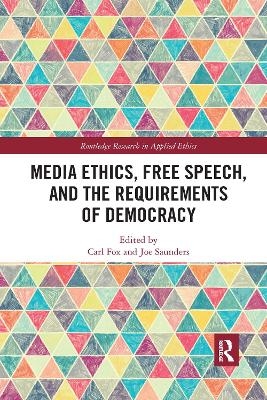
Media Ethics, Free Speech, and the Requirements of Democracy
Routledge (Verlag)
978-0-367-73215-8 (ISBN)
How we understand, protect, and discharge our rights and responsibilities as citizens in a democratic society committed to the principle of political equality is intimately connected to the standards and behaviour of our media in general, and our news media in particular. However, the media does not just stand between the citizenry and their leaders, or indeed between citizens and each other. The media is often the site where individuals attempt to realise some of the most fundamental democratic liberties, including the right to free speech.
Media Ethics, Free Speech, and the Requirements of Democracy explores the conflict between the rights that people exercise in, and through, the modern media and the responsibilities that accrue on account of its awesome and increasing power. The individual chapters—written by leading scholars from the US, UK, and Australia—address several recent events and controversial developments in the media, including Brexit, the rise of Trump, Lynton Crosby, Charlie Hebdo, dog-whistle politics, fake news, and political correctness. This much-needed philosophical treatment is a welcome addition to the recent literature in media ethics. It will be of interest to scholars across political and social philosophy, applied ethics, media and communication studies, and political science who are interested in the important issues surrounding the media and free speech and democracy.
Carl Fox is a lecturer at the IDEA Centre in the University of Leeds. He won the 2014 Robert Papazian Essay Prize for his paper on ‘Political Authority, Practical Identity, and Binding Citizens’. He has also worked as a sub-editor on the Irish Independent, Sunday Independent, and Evening Herald. Joe Saunders is an Assistant Professor in Philosophy at Durham University. Funnily enough, he won the 2015 Robert Papazian Essay Prize for his paper ‘Kant and the Problem of Recognition’. He currently works on freedom, love, media ethics, Kant and the post-Kantian tradition.
Introduction
Carl Fox and Joe Saunders
Part I: Democracy and the Media
1. Immigration in the Brexit Campaign: Protean Dogwhistles and Political Manipulation
Jennifer Saul
2. The Ethics of Interrogation
Julian Baggini
3. Lynton Crosby and the Dark Arts of Democracy
Joe Saunders
4. Trust Me: News, Credibility Deficits, and Balance
Carrie Figdor
5. Protecting Politicians’ Privacy for the Sake of Democracy
Rob Lawlor and Kevin Macnish
Part II: Free Speech and the Media
6. Free Speech and Liberal Community
Gerald Lang
7. Political Correctness Gone Viral
Robert Simpson and Waleed Aly
8. Journalism, Offence, and Free Speech
Carl Fox
9. The Real Story about Fake News
Kay Mathiesen
Part III: Bias, Ideology and the Media
10. How Media Makes, Ignites and Breaks Ideology
David Livingstone Smith
11. "I’m not with stupid": Tales of False Consciousness for a Post-Brexit Age
Lorna Finlayson
12. Partisan News, the Myth of Objectivity, and the Standards of Responsible Journalism
Christopher Meyers
13. The Obligation to Diversify One’s Sources: Against Epistemic Partisanship in the Consumption of News Media
Alex Worsnip
| Erscheinungsdatum | 16.01.2021 |
|---|---|
| Reihe/Serie | Routledge Research in Applied Ethics |
| Verlagsort | London |
| Sprache | englisch |
| Maße | 152 x 229 mm |
| Gewicht | 522 g |
| Themenwelt | Geisteswissenschaften ► Philosophie ► Ethik |
| Sozialwissenschaften ► Kommunikation / Medien ► Medienwissenschaft | |
| Sozialwissenschaften ► Politik / Verwaltung | |
| ISBN-10 | 0-367-73215-7 / 0367732157 |
| ISBN-13 | 978-0-367-73215-8 / 9780367732158 |
| Zustand | Neuware |
| Haben Sie eine Frage zum Produkt? |
aus dem Bereich


